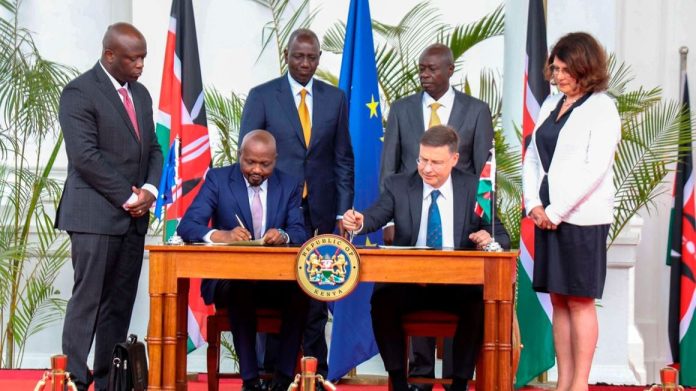A Kampala-based NGO has gone to the East African Court of Justice seeking orders to block Kenya and the EAC Secretary-General from implementing the Economic Partnership Agreement (EPA) Nairobi signed with the European Union.
The Centre for Law Economics and Policy on East African Integration (CLEP-EA), a think tank and research centre, says Kenya violated the EAC Treaty by signing the trade agreement.
CLEP-EA also faults the EAC Secretary-General for “abdicating his responsibilities and functions under the Treaty by failing to warn and/or stop Kenya from entering into the illegal EPA with the EU, and Kenya’s failure to share renegotiated EPA with the partner states.”
The agreement builds on negotiations for an EPA with the EAC partner states at the time – Burundi, Kenya, Rwanda, Tanzania, and Uganda – which were finalised in October 2014. Kenya and the EU signed the EPA on December 18, 2023 and Kenya is the only EAC member to ratify the EU-EAC EPA seeking more access to the European market.
The other EAC partner states are least developed countries and, as such, enjoy duty-free and quota-free access to the EU market.
CLEP-EA says “The EAC Summit via a decision of February 2021 allowed any EAC Partner State to move forward under “variable geometry” to conclude EPA with the EU, where Kenya proceeded to renegotiate the EPA and concluded an amended EPA with the EU in outright violation of the EAC Treaty and Protocols. In addition, entering the EPA on the basis of variable geometry was unlawful and an abuse of that principle.”
CLEP East Africa alleges that Kenya did not notify the EAC Secretariat and other EAC States about the renegotiated and/or amended EPA with the EU thus breaching the Protocol for EAC Customs Union and the Common Market.
It wants the EPA declared null and void “as it failed to observe the requirements of the EAC Treaty protocols, the Customs Union, Common Market and African Continental Free Trade Area.”
“As a consequence of Kenya’s actions and/or omissions above, the Community’s objectives of attaining a Customs Union and a Common Market have been jeopardised, thus hampering the full implementation of the Treaty,” they say.
The NGO wants a declaration the EPA is illegal, null and void.
Among the grounds for suing Kenya, CLEP East Africa says that the EPA will allow cheap imports into Kenya and therefore into the EAC region, thereby distorting trade.
“It is also affecting the common application of the EAC Common External Tariff, thus fusing the EAC to the EU’s Free Trade Area. The Kenya and EU Epa will distort trade in goods within the EAC market.”
Kenya, Uganda, Tanzania, Rwanda and Burundi first negotiated the EAC-EU-EPA in 2016, but only Kenya and Rwanda signed.
“Despite the Partner States of Uganda, Tanzania, Burundi taking part in the 2016 negotiations, they were entitled to be informed of the re-negotiated and/or the amended EPA between Kenya and the EU pursuant to EAC Customs Union and common market protocols,” the application reads.
“The actions of Kenya allow other trade-related issues in areas where the Community has not had a common position thus negatively affecting the interest of other EAC Partner States.”
CLEP East Africa further contends that by virtue of Kenya implementing the Epa with the EU, it will not implement the CET and by default fusing the entire community to the EU Free Trade Area contrary to the provisions of the EAC Treaty.
They argue that not all EAC partner states have been notified of the EPA, as the DRC and Somalia, who joined the bloc recently, are yet to be informed and yet Kenya’s decision is expected to be binding for the region.
Under the Customs Union, goods imported into the East Africa are subjected to CET.
“The Kenya-EU EPA contravenes the EAC Treaty by opening up the Community to illegal trade for endangered wild animal products in the nature of elephant tusks, hippo teeth, rhinoceros horns, and others, imported to Kenya from the EU whose duty will be reduced progressively and will be duty-free in 25 years,” the application says.

